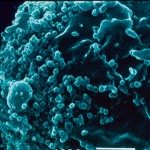Lien vers Pubmed [PMID] – 3114567
Leuk. Res. 1987;11(8):753-60
Adherent cells display an important accessory role on normal T-cell colony formation. Since the in-vitro proliferation of T colony-forming cells (T-CFC) from AIDS patients is extremely impaired we studied the effect of patients’ adherent cells on T-CFC growth. Patients’ peripheral blood mononuclear cells (PBMC) were fractionated on the basis of rosette formation with sheep red blood cells and complement-mediated cytotoxicity with OKT3 monoclonal antibody (E-T3-). Both mature (E+) T cells and E-OKT3- cell fractions failed to generate T-cell colonies although colony growth could be obtained from unfractionated PBMC. In five out of 12 AIDS patients, adherent cell-depletion of PBMC enhanced the plating efficiency. Moreover, patients’ but not normal adherent cells could inhibit normal T-cell colony growth in a dose-dependent manner. Media conditioned by patients’ unstimulated adherent cells (LCM-A+p) also inhibit normal T-cell colony formation. In addition, LCM-A+p were capable of inhibiting interleukin 2-receptor (IL2-R) expression and interleukin 2 (IL2) production by normal mitogen-stimulated T cells. These LCM-A+p did not contain detectable reverse transcriptase activity nor could they infect the CEM T-cell line which is permissive to human immunodeficiency virus (HIV). Conversely, this adherent cell-derived inhibitory activity could be abrogated by heating or treatment with proteolytic enzymes. These findings indicate that the low T-cell colony formation in some AIDS patients could be due to adherent cell-derived inhibitory activity(ies).
